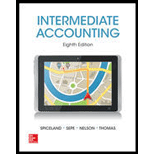
INTERMEDIATE ACCOUNTING
8th Edition
ISBN: 9780078025839
Author: J. David Spiceland
Publisher: McGraw-Hill Education
expand_more
expand_more
format_list_bulleted
Question
Chapter 14, Problem 14.23Q
To determine
Troubled Debt Restructuring
When the unique terms of a debt agreement is encouraged by the financial complications by the debtor (borrower), the new agreement is referred to as a troubled debt restructuring. It includes some allowances on the part of the creditors (issuer).
To find out: The accounting procedure, under the new agreement total future cash payment is less or/and more than the book value of the debt.
Expert Solution & Answer
Trending nowThis is a popular solution!

Students have asked these similar questions
Please do part b please.
Please fill all cells!
PLEASE HELP
Chapter 14 Solutions
INTERMEDIATE ACCOUNTING
Ch. 14 - How is periodic interest determined for...Ch. 14 - As a general rule, how should long-term...Ch. 14 - How are bonds and notes the same? How do they...Ch. 14 - What information is contained in a bond indenture?...Ch. 14 - Prob. 14.5QCh. 14 - How is the price determined for a bond (or bond...Ch. 14 - A zero-coupon bond pays no interest. Explain.Ch. 14 - Prob. 14.8QCh. 14 - Compare the two commonly used methods of...Ch. 14 - Prob. 14.10Q
Ch. 14 - When a notes stated rate of interest is...Ch. 14 - How does an installment note differ from a note...Ch. 14 - Prob. 14.13QCh. 14 - Prob. 14.14QCh. 14 - Air Supply issued 6 million of 9%, 10-year...Ch. 14 - Both convertible bonds and bonds issued with...Ch. 14 - Prob. 14.17QCh. 14 - Cordova Tools has bonds outstanding during a year...Ch. 14 - If a company prepares its financial statements...Ch. 14 - (Based on Appendix 14A) Why will bonds always sell...Ch. 14 - Prob. 14.21QCh. 14 - Prob. 14.22QCh. 14 - Prob. 14.23QCh. 14 - Bank loan; accrued interest LO132 On October 1,...Ch. 14 - Non-interest-bearing note; accrued interest LO132...Ch. 14 - Determining the price of bonds LO142 A company...Ch. 14 - Determining the price of bonds LO142 A company...Ch. 14 - Effective interest on bonds LO142 On January 1, a...Ch. 14 - Effective interest on bonds LO142 On January 1, a...Ch. 14 - Straight-line interest on bonds LO142 On January...Ch. 14 - Investment in bonds LO142 On January 1, a company...Ch. 14 - Prob. 14.9BECh. 14 - Note with unrealistic interest rate LO143 On...Ch. 14 - Installment note LO143 On January 1, a company...Ch. 14 - Prob. 14.12BECh. 14 - Bonds with detachable warrants LO145 Hoffman...Ch. 14 - Convertible bonds LO145 Hoffman Corporation...Ch. 14 - Prob. 14.15BECh. 14 - Prob. 14.1ECh. 14 - Prob. 14.2ECh. 14 - Prob. 14.3ECh. 14 - Prob. 14.4ECh. 14 - Prob. 14.5ECh. 14 - E 14–6
Bonds; issuance; effective...Ch. 14 - Prob. 14.7ECh. 14 - Prob. 14.8ECh. 14 - Prob. 14.9ECh. 14 - Prob. 14.10ECh. 14 - Prob. 14.11ECh. 14 - Prob. 14.12ECh. 14 - Prob. 14.13ECh. 14 - Prob. 14.14ECh. 14 - Prob. 14.15ECh. 14 - Prob. 14.16ECh. 14 - Prob. 14.17ECh. 14 - Prob. 14.18ECh. 14 - Prob. 14.19ECh. 14 - Prob. 14.20ECh. 14 - Prob. 14.21ECh. 14 - Prob. 14.22ECh. 14 - Prob. 14.23ECh. 14 - Prob. 14.24ECh. 14 - Prob. 14.25ECh. 14 - Prob. 14.26ECh. 14 - Prob. 14.27ECh. 14 - Prob. 14.28ECh. 14 - Prob. 14.29ECh. 14 - Prob. 14.30ECh. 14 - Prob. 14.31ECh. 14 - Prob. 14.32ECh. 14 - Prob. 14.33ECh. 14 - Prob. 14.34ECh. 14 - Prob. 14.35ECh. 14 - Prob. 14.36ECh. 14 - Prob. 1CPACh. 14 - Prob. 2CPACh. 14 - Prob. 3CPACh. 14 - Prob. 4CPACh. 14 - Prob. 5CPACh. 14 - Prob. 6CPACh. 14 - Prob. 7CPACh. 14 - Prob. 8CPACh. 14 - Prob. 9CPACh. 14 - Prob. 10CPACh. 14 - 11. On May 1, 2016, Maine Co. issued 10-year...Ch. 14 - Prob. 12CPACh. 14 - Prob. 1CMACh. 14 - Prob. 2CMACh. 14 - Prob. 3CMACh. 14 - Prob. 14.1PCh. 14 - Prob. 14.2PCh. 14 - Prob. 14.3PCh. 14 - Prob. 14.4PCh. 14 - Prob. 14.5PCh. 14 - Prob. 14.6PCh. 14 - Prob. 14.7PCh. 14 - Prob. 14.8PCh. 14 - Prob. 14.9PCh. 14 - Prob. 14.10PCh. 14 - Prob. 14.11PCh. 14 - Prob. 14.12PCh. 14 - Prob. 14.13PCh. 14 - Prob. 14.14PCh. 14 - Prob. 14.15PCh. 14 - Prob. 14.16PCh. 14 - Prob. 14.17PCh. 14 - Prob. 14.18PCh. 14 - Prob. 14.19PCh. 14 - Prob. 14.21PCh. 14 - Prob. 14.22PCh. 14 - Prob. 14.23PCh. 14 - Prob. 14.24PCh. 14 - Prob. 14.25PCh. 14 - Prob. 14.26PCh. 14 - Prob. 14.1BYPCh. 14 - Real World Case 142 Zero-coupon debt; HP Inc. ...Ch. 14 - Prob. 14.4BYPCh. 14 - Prob. 14.5BYPCh. 14 - Prob. 14.6BYPCh. 14 - Prob. 14.8BYPCh. 14 - Prob. 14.9BYPCh. 14 - Prob. 14.10BYPCh. 14 - Analysis Case 14–11
Bonds; conversion;...
Knowledge Booster
Similar questions
- One company might depreciate a new computer over three years while another company might depreciate the same model computer over five years...and both companies are right. True Falsearrow_forwardno chatgpAccumulated Depreciation will appear as a deduction within the section of the balance sheet labeled as Property, Plant and Equipment. True Falsearrow_forwardNo ai Depreciation Expense is shown on the income statement in order to achieve accounting's matching principle. True Falsearrow_forward
- no aiOne company might depreciate a new computer over three years while another company might depreciate the same model computer over five years...and both companies are right. True Falsearrow_forwardno ai An asset's useful life is the same as its physical life? True Falsearrow_forwardno ai Depreciation Expense reflects an allocation of an asset's original cost rather than an allocation based on the economic value that is being consumed. True Falsearrow_forward
- The purpose of depreciation is to have the balance sheet report the current value of an asset. True Falsearrow_forwardDepreciation Expense shown on a company's income statement must be the same amount as the depreciation expense on the company's income tax return. True Falsearrow_forwardDont use AI Give soln.arrow_forward
arrow_back_ios
SEE MORE QUESTIONS
arrow_forward_ios
Recommended textbooks for you
